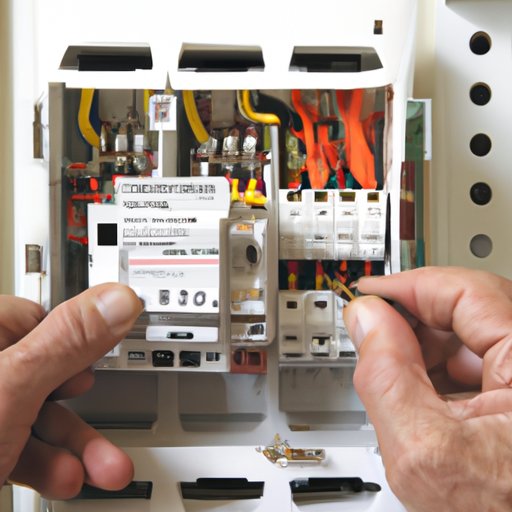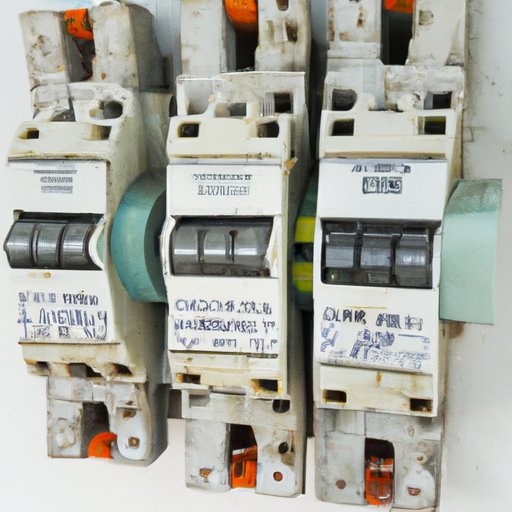Introduction
When a circuit breaker trips, it interrupts the flow of electricity in a home or business. To understand why this occurs, it’s important to first understand what a circuit breaker is and how it functions. A circuit breaker is an electrical device that helps to protect against overloads and short circuits. It works by cutting off the power supply if it detects an electrical problem. When a circuit breaker trips, it needs to be reset before the power can be restored.
In this article, we’ll explore why circuit breakers trip, analyzing the most common causes of breaker trips. We’ll also look at the benefits of resetting your circuit breakers, examining the impact of overloading your circuits, investigating the advantages of installing ground fault circuit interrupters (GFCIs), and understanding when to replace a circuit breaker.

Analyzing Common Causes of Circuit Breaker Tripping
There are several common causes of circuit breaker trips. Let’s take a closer look at each one.
Overloading Circuits
One of the most common causes of circuit breaker trips is an overloaded circuit. This occurs when too many appliances are plugged into one circuit, resulting in an excess of electricity being drawn from the circuit. If the circuit is not designed to handle this amount of electricity, it will trip the breaker.
Short Circuits
A short circuit is another common cause of circuit breaker trips. This occurs when two wires in a circuit come into contact with each other, causing an excessive amount of current to flow through the circuit. This can damage the wiring and potentially start a fire, so the circuit breaker trips to prevent further damage.
Ground Faults
Ground faults occur when an appliance draws electricity from a faulty ground wire. This can cause an electric shock, and the circuit breaker trips to prevent further harm. Ground faults can be caused by exposed wires, damaged insulation, or faulty wiring.
Aging Breakers
Circuit breakers can become worn out over time, making them less effective at protecting against overloads and short circuits. If a breaker is old and not functioning properly, it may trip more often than it should.

Exploring the Benefits of Resetting Your Circuit Breakers
Resetting a circuit breaker is a simple process that can provide several benefits. Let’s take a look at some of these advantages.
Safety Benefits
Resetting a circuit breaker can help to ensure the safety of your home or business. By preventing overloads and short circuits, resetting a breaker can reduce the risk of fire and electric shock. It can also help to prolong the life of your electrical system.
Cost Savings
Resetting a circuit breaker can save you money in the long run by helping to prevent costly repairs. By avoiding problems such as overloaded circuits, short circuits, and ground faults, you can protect your electrical system from damage and extend its lifespan.
Examining the Impact of Overloading Your Circuits
Overloading your circuits can have serious consequences. Let’s take a look at some of the potential risks associated with this issue.
Potential Fire Hazards
An overloaded circuit can create a dangerous situation in which a fire could start. If a circuit is overloaded, it can cause the wiring to overheat, which can lead to a fire. This is why it’s important to be aware of the amount of electricity being used on a particular circuit.
Diminished Efficiency
If a circuit is overloaded, it can affect the performance of the appliances and devices connected to it. This can result in decreased efficiency and reduced energy efficiency, leading to higher energy bills.
Investigating the Advantages of Installing Ground Fault Circuit Interrupters
Ground fault circuit interrupters (GFCIs) are an important safety feature that can help to prevent electric shock. They work by detecting even small amounts of current leakage and disconnecting the power supply. Let’s take a look at some of the benefits of installing GFCIs.
Increased Safety
GFCIs can help to keep your home or business safe by providing protection against electric shocks. They can detect any current leakage and shut off the power supply before any harm can be done.
Improved Electrical System Performance
Installing GFCIs can help to improve the performance of your electrical system. By preventing ground faults, GFCIs can help to reduce the risk of damage to your wiring and increase the efficiency of your appliances and devices.

Understanding When to Replace a Circuit Breaker
Circuit breakers are designed to last for years, but eventually they will need to be replaced. Here are some signs that indicate it’s time to replace a circuit breaker.
Signs of Wear and Tear
If a circuit breaker is showing signs of wear and tear, such as rust or discoloration, it may be time to replace it. These signs can indicate that the breaker is no longer functioning properly and needs to be replaced.
Excessive Tripping
If a circuit breaker is tripping more often than it should, it may be a sign that it needs to be replaced. This could be due to a faulty breaker or an overloaded circuit. Either way, it’s best to have it checked by a professional.
Conclusion
In this article, we explored why circuit breakers trip, analyzing the most common causes of breaker trips. We looked at the benefits of resetting your circuit breakers, examining the impact of overloading your circuits, investigating the advantages of installing ground fault circuit interrupters (GFCIs), and understanding when to replace a circuit breaker.
To summarize, circuit breakers trip for a variety of reasons, including overloading circuits, short circuits, ground faults, and aging breakers. Resetting your circuit breakers can provide safety benefits and cost savings, while overloading your circuits can lead to potential fire hazards and diminished efficiency. Installing GFCIs can help to increase safety and improve electrical system performance, and it’s important to know when to replace a circuit breaker.
By understanding why circuit breakers trip and taking steps to prevent trips, you can ensure the safety of your home or business and protect your electrical system from damage.
(Note: Is this article not meeting your expectations? Do you have knowledge or insights to share? Unlock new opportunities and expand your reach by joining our authors team. Click Registration to join us and share your expertise with our readers.)
